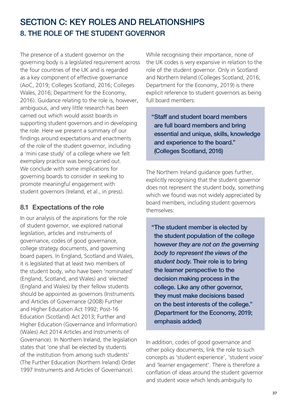
37
The presence of a student governor on the
governing body is a legislated requirement across
the four countries of the UK and is regarded
as a key component of effective governance
(AoC, 2019; Colleges Scotland, 2016; Colleges
Wales, 2016; Department for the Economy,
2016). Guidance relating to the role is, however,
ambiguous, and very little research has been
carried out which would assist boards in
supporting student governors and in developing
the role. Here we present a summary of our
findings around expectations and enactments
of the role of the student governor, including
a 'mini case study' of a college where we felt
exemplary practice was being carried out.
We conclude with some implications for
governing boards to consider in seeking to
promote meaningful engagement with
student governors (Ireland, et al., in press).
8.1��Expectations�of�the�role
In our analysis of the aspirations for the role
of student governor, we explored national
legislation, articles and instruments of
governance, codes of good governance,
college strategy documents, and governing
board papers. In England, Scotland and Wales,
it is legislated that at least two members of
the student body, who have been 'nominated'
(England, Scotland, and Wales) and 'elected'
(England and Wales) by their fellow students
should be appointed as governors (Instruments
and Articles of Governance (2008) Further
and Higher Education Act 1992; Post-16
Education (Scotland) Act 2013; Further and
Higher Education (Governance and Information)
(Wales) Act 2014 Articles and Instruments of
Governance). In Northern Ireland, the legislation
states that 'one shall be elected by students
of the institution from among such students'
(The Further Education (Northern Ireland) Order
1997 Instruments and Articles of Governance).
While recognising their importance, none of
the UK codes is very expansive in relation to the
role of the student governor. Only in Scotland
and Northern Ireland (Colleges Scotland, 2016;
Department for the Economy, 2019) is there
explicit reference to student governors as being
full board members:
The Northern Ireland guidance goes further,
explicitly recognising that the student governor
does not represent the student body, something
which we found was not widely appreciated by
board members, including student governors
themselves:
In addition, codes of good governance and
other policy documents, link the role to such
concepts as 'student experience', 'student voice'
and 'learner engagement'. There is therefore a
conflation of ideas around the student governor
and student voice which lends ambiguity to
SECTION C: KEY ROLES AND RELATIONSHIPS
8.�THE�ROLE�OF�THE�STUDENT�GOVERNOR
"�Staff�and�student�board�members�
are full board members and bring
essential and unique, skills, knowledge
and experience to the board."
(Colleges�Scotland,�2016)
"�The�student�member�is�elected�by�
the student population of the college
however they are not on the governing
body to represent the views of the
student body. Their role is to bring
the learner perspective to the
decision making process in the
college.�Like�any�other�governor,�
they�must�make�decisions�based�
on the best interests of the college."
(Department�for�the�Economy,�2019;�
emphasis�added)